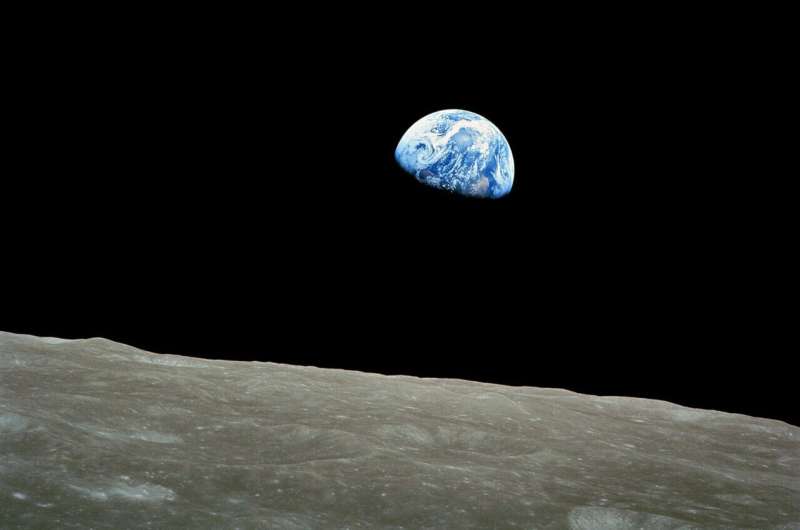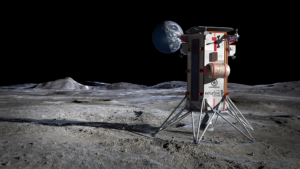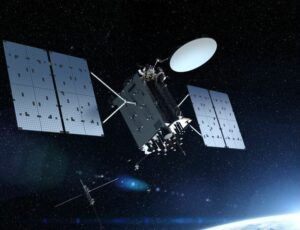US pledges to end anti-satellite missile tests
Tuesday, 19 April 2022 19:26
The United States announced a commitment to stop testing anti-satellite missiles that generate dangerous debris in space, a measure described Tuesday as "an important step" by the head of NASA.
The United States, the first country to make such a pledge, has encouraged other nations to follow its lead, with the goal of establishing "a new international norm for responsible behavior in space," the White House said in a statement.
"This is especially important as there is an ever-increasing number of states and non-governmental entities that rely on space services and space assets which are vulnerable to debris," it added.
The announcement comes five months after Russia destroyed one of its own satellites in a missile test that created a cloud of debris and forced the seven crew on the International Space Station to temporarily take shelter in their return ships.
Washington denounced the strike as "dangerous and irresponsible."
Russia and the United States are among the small handful of nations that possess the high-tech anti-satellite weapons known as ASATs. The missiles have also been used by China and India.
Lonestar emerges from stealth with plans for lunar data centers
Tuesday, 19 April 2022 18:10
Cloud computing startup Lonestar said April 19 it has contracted commercial lunar lander developer Intuitive Machines to deploy a mini proof-of-concept data center on the moon next year.
The post Lonestar emerges from stealth with plans for lunar data centers appeared first on SpaceNews.
Celebrating Hubble’s 32nd birthday with a galaxy grouping
Tuesday, 19 April 2022 15:00 Image:
Celebrating Hubble’s 32nd birthday with a galaxy grouping
Image:
Celebrating Hubble’s 32nd birthday with a galaxy grouping Planetary science decadal endorses Mars sample return, outer planets missions
Tuesday, 19 April 2022 14:00
A study outlining priorities in planetary science for the next decade backs continued efforts to return samples from Mars while recommending NASA pursue missions to the planet Uranus and an icy moon of Saturn.
NASA to award demonstrations of commercial satellite services to replace TDRS
Tuesday, 19 April 2022 12:48
NASA expects to make awards this spring in the next phase of its effort to transition from operating its decades-old network of communications satellites to purchasing commercial services.
The post NASA to award demonstrations of commercial satellite services to replace TDRS appeared first on SpaceNews.
India examining crashed space debris suspected to be parts of China’s Long March rocket
Tuesday, 19 April 2022 11:16
India’s space agency is examining a large metal ring and a cylinder-like object that fell into rural western India April 2, with a preliminary investigation suggesting they could be parts of a Chinese space rocket’s upper stage that reentered the atmosphere that day.
Op-ed | Get the Bullseye Off GPS
Tuesday, 19 April 2022 11:00
Protecting GPS satellites and signals is essential to U.S. national and economic security. While some have opined that the solution is more and better GPS, the most effective and least expensive solution is to make GPS a much less attractive target.
Safe ISS operation should remain priority, Space Foundation says
Tuesday, 19 April 2022 08:42 All countries participating in the International Space Station (ISS) project should focus on maintaining its safety and continued work, and keep in mind the long history of cooperation, as Russia is reviewing the future of its participation after sanctions, Space Foundation CEO Tom Zelibor told Sputnik.
In March, Roscosmos Director General Dmitry Rogozin said the Russian space agency will
All countries participating in the International Space Station (ISS) project should focus on maintaining its safety and continued work, and keep in mind the long history of cooperation, as Russia is reviewing the future of its participation after sanctions, Space Foundation CEO Tom Zelibor told Sputnik.
In March, Roscosmos Director General Dmitry Rogozin said the Russian space agency will Russian cosmonauts activate robotic arm on ISS during spacewalk
Tuesday, 19 April 2022 08:42 Two Russian cosmonauts aboard the International Space Station on Monday completed the first of two spacewalks to activate the station's new European Robotic Arm.
Cosmonauts Oleg Artemyev and Denis Matveev left the Russian Nauka module at 11:00 a.m. EDT to install the automated arm's control panel, finishing up their work and returning to the ISS around 5:48 p.m. EDT.
NASA's websi
Two Russian cosmonauts aboard the International Space Station on Monday completed the first of two spacewalks to activate the station's new European Robotic Arm.
Cosmonauts Oleg Artemyev and Denis Matveev left the Russian Nauka module at 11:00 a.m. EDT to install the automated arm's control panel, finishing up their work and returning to the ISS around 5:48 p.m. EDT.
NASA's websi Shenzhou XIII mission a success in testing tech for space station
Tuesday, 19 April 2022 08:42 The Shenzhou XIII mission has concluded the technology demonstration phase in the construction of China's Tiangong space station, according to a senior space official.
Hao Chun, head of the China Manned Space Agency, told a news conference in Beijing on Sunday that the phase, which included the deployment of Tiangong's core module and two manned spaceflights, has laid a solid foundation fo
The Shenzhou XIII mission has concluded the technology demonstration phase in the construction of China's Tiangong space station, according to a senior space official.
Hao Chun, head of the China Manned Space Agency, told a news conference in Beijing on Sunday that the phase, which included the deployment of Tiangong's core module and two manned spaceflights, has laid a solid foundation fo China reveals missions of Shenzhou-14, Shenzhou-15 space crews
Tuesday, 19 April 2022 08:42 The crews of China's Shenzhou-14 and Shenzhou-15 missions have been selected, and are carrying out relevant training and mission preparations, according to a press conference on Sunday.
Both crews will stay in orbit for six months, and they will for the first time rotate in orbit to realize the uninterrupted manned residence, Huang Weifen, chief designer of the China manned space program's
The crews of China's Shenzhou-14 and Shenzhou-15 missions have been selected, and are carrying out relevant training and mission preparations, according to a press conference on Sunday.
Both crews will stay in orbit for six months, and they will for the first time rotate in orbit to realize the uninterrupted manned residence, Huang Weifen, chief designer of the China manned space program's Core module of China's space station achieves anticipated goal
Tuesday, 19 April 2022 08:42 Tianhe, the core module of China's space station, has completed its verification of key technologies and achieved its expected goal.
Yang Hong, chief designer of the space station system of the China Manned Space Program at the China Academy of Space Technology, made the remarks at a press conference in Beijing on Sunday.
Yang said the core module has been in orbit for almost one y
Tianhe, the core module of China's space station, has completed its verification of key technologies and achieved its expected goal.
Yang Hong, chief designer of the space station system of the China Manned Space Program at the China Academy of Space Technology, made the remarks at a press conference in Beijing on Sunday.
Yang said the core module has been in orbit for almost one y Planet releases slew of datasets for planetary variables
Tuesday, 19 April 2022 08:42 Planet Labs PBC has announced the release of Planetary Variables, a new product offering consisting of three pre-processed, accurate data feeds that measure the conditions of dynamic systems on the surface of the Earth. The three Planetary Variables feeds consist of Soil Water Content, Land Surface Temperature, and Vegetation Biomass Proxy to help customers make informed decisions in industries
Planet Labs PBC has announced the release of Planetary Variables, a new product offering consisting of three pre-processed, accurate data feeds that measure the conditions of dynamic systems on the surface of the Earth. The three Planetary Variables feeds consist of Soil Water Content, Land Surface Temperature, and Vegetation Biomass Proxy to help customers make informed decisions in industries SpaceX launches second U.S. reconnaissance satellite on Falcon 9 rocket
Tuesday, 19 April 2022 08:42 SpaceX on Sunday successfully launched a U.S. spy satellite for the National Reconnaissance Office on its Falcon 9 rocket.
The company announced liftoff in the launch from the Vandenberg Space Force Base in California at 9:14 a.m.
The Falcon 9 carried the NROL-85 satellite that is used to collect and deliver "space-based intelligence, surveillance and reconnaissance," the office
SpaceX on Sunday successfully launched a U.S. spy satellite for the National Reconnaissance Office on its Falcon 9 rocket.
The company announced liftoff in the launch from the Vandenberg Space Force Base in California at 9:14 a.m.
The Falcon 9 carried the NROL-85 satellite that is used to collect and deliver "space-based intelligence, surveillance and reconnaissance," the office 100 km, the current Longest Distance of Quantum Secure Direct Communication
Tuesday, 19 April 2022 08:42 Confidentiality of communication is essential in modern societies. Traditional way of secure communication is to use encryption, which is based on the computational difficulty of certain mathematical problems such as factorizing large integers. In such schemes, the two parties first distribute a key using an asymmetric cryptographic algorithm such as RSA, which is based on the difficulty of inte
Confidentiality of communication is essential in modern societies. Traditional way of secure communication is to use encryption, which is based on the computational difficulty of certain mathematical problems such as factorizing large integers. In such schemes, the two parties first distribute a key using an asymmetric cryptographic algorithm such as RSA, which is based on the difficulty of inte 
